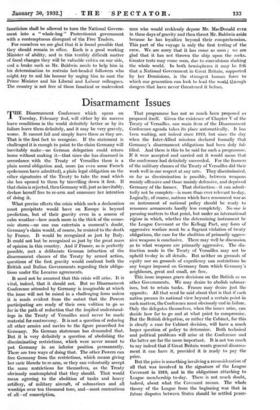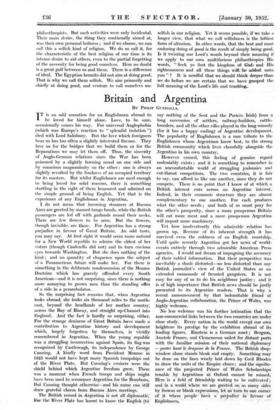Disarm= ent Issues
rEIHE Disarmament Conference which opens on A- Tuesday, February 2nd, will either by its success leave conditions in the world definitely better or by its failure leave them definitely, and it may be very gravely, worse. It cannot fail and simply leave them as they are. That is the first fact to recognize. If the statement is challenged it is enough to point to the claim Germany will inevitably make—no German delegation could return home without making it—that since she has disarmed in accordance, with the. Treaty of Versailles there is a plain moral obligation and, more (as even some French spokesmen have admitted), a plain legal obligation on the other signatories of the Treaty to take the road which she has opened to them by travelling down it first. If that claim is rejected, then Germany will, just as inevitably, declare herself free to re-arm and announce her intention Of doing it.
What precise effects the crisis which such a declaration must precipitate would have on Europe is beyond prediction, but of their gravity even in a season of calm weather—how much more in the thick of the econo- mic storm—no one can entertain a moment's doubt. Germany's claim would, of course, be resisted to the death by France. It would be recognized as just by Italy. It could not but be recognized as just by the great mass of opinion in this country. And if France, as is perfectly possible, met a deliberate German infraction of the disarmament clauses of the Treaty by armed action, questions of the first gravity would confront both the British and Italian Governments regarding their obliga- tions under the Locarno agreements.
It need not be assumed that this crisis will arise. It is vital, indeed, that it should not. But no Disarmament Conference attended by Germany is imaginable at which the issue will not be raised in a challenging form unless it is made evident from the outset that the Powers participating are ready of their own volition to go so far in the path of reduction that the implied understand- ings in the Treaty of Versailles need never be made material for controversy. It is not a question of reducing all other armies and navies to the figure prescribed for Germany. No German statesman has demanded that. But it is very definitely a question of abolishing the discriminating restrictions, which were never meant to put Germany in an inferior position permanently. There are two ways of doing that. The other Powers can free Germany from the restrictions, which means giving her carte blanche to re-arm, or they can voluntarily accept the same restrictions for themselves, as the Treaty obviously contemplated that they should. That would mean agreeing to the abolition of tanks and heavy artillery, of military aircraft, of submarines and all warships over ten thousand tons, and—most contentious of all—of conscription. That programme has not so much been proposed as proposed itself. Given the existence of Chapter V of the Treaty of Versailles, one main item of the Disarmament Conference agenda takes its place automatically. It has been waiting, not indeed since 1919, but since the day when the Inter-Allied missions declared formally that Germany's disarmament obligations had been duly ful- filled. And there is this to be said for such a programme. If it were accepted and carried out it would mean that the conference had definitely succeeded. For the framers of the military clauses of the Treaty of Versailles did their work well in one respect at any rate. They discriminated, so far as discrimination is possible, between weapons mainly offensive and those mainly defensive, and deprived Germany of the former. That distinction—it can admit- tedly not be complete—is more than ever relevant to-day. Logically, of course, nations which have renounced war as an instrument of national policy should be ready to renounce armaments hardly less completely. No one is pressing matters to that point, but under an international regime in which, whether the determining instrument be the League Covenant or the Kellogg Pact, any form of aggressive warfare must be a flagrant violation of treaty obligations, the case for the abolition of primarily aggres- sive weapons is conclusive. There may well be discussion as to what weapons are primarily aggressive. The dis- tinction made in the Treaty of Versailles may not be upheld to-day in all details. But neither on grounds of equity nor on grounds of expediency can restrictions be any longer imposed on Germany from which Germany's neighbours, great and small, are free.
This issue imposes grave decisions on the British as on other Governments. We may desire to abolish submar- ines, but to retain tanks. France may desire just the opposite. All that need be said about that is that if each nation presses its national view beyond a certain point in such matters, the Conference must obviously end in failure. Only the delegates themselves, when the issues arise, can decide how far to go and at what point to compromise. But the British delegation, or rather the Cabinet, for this is clearly a case for Cabinet decision, will have a much larger question of policy to determine. Both technical and political problems will arise at the Conference and the latter are far the more important. It is not too much to say indeed that if Great Britain wants general disarma- ment it can have it, provided it is ready to pay the price.
But the price is something involving a reconsideration of all that was involved in the signature of the League Covenant in 1919, and in the obligations attaching to League membership to-day. There is not much doubt, indeed, about what the Covenant means. The whole theory of the League from the beginning was that in future disputes between States should be settled peace- philanthropists. But such activities were only incidental. Their main desire, the thing they continually aimed at, was their own personal holiness ; and if we choose, we can call this a selfish kind of religion. We do so call it, for the characteristic of the best religion of our time is its intense desire to aid others, even to the partial forgetting of the necessity for being good ourselves. Here no doubt is a great gulf between us and them. There is a difference of ideal. The Egyptian hermits did not aim at doing good: That is why we call them selfish. We aim primarily and chiefly at doing good, and venture to call ourselves un-
selfish in our religion. Yet it seems possible, if we take a longer view, that what we call selfishness is the loftiest form of altruism. In other words, that the best and most enduring doing of good is the result of simply being good. Is it twisting our Lord's words beyond their meaning if we apply to our own multifarious philanthropies His words, " Seek ye first the kingdom. of, Gods and. His righteousness and all these things wilt tie- added: unto you " ? It is needful that we should think deeper than we do before we are certain that we have grasped the
full meaning of the Lord's life and tectehing, .





































 Previous page
Previous page